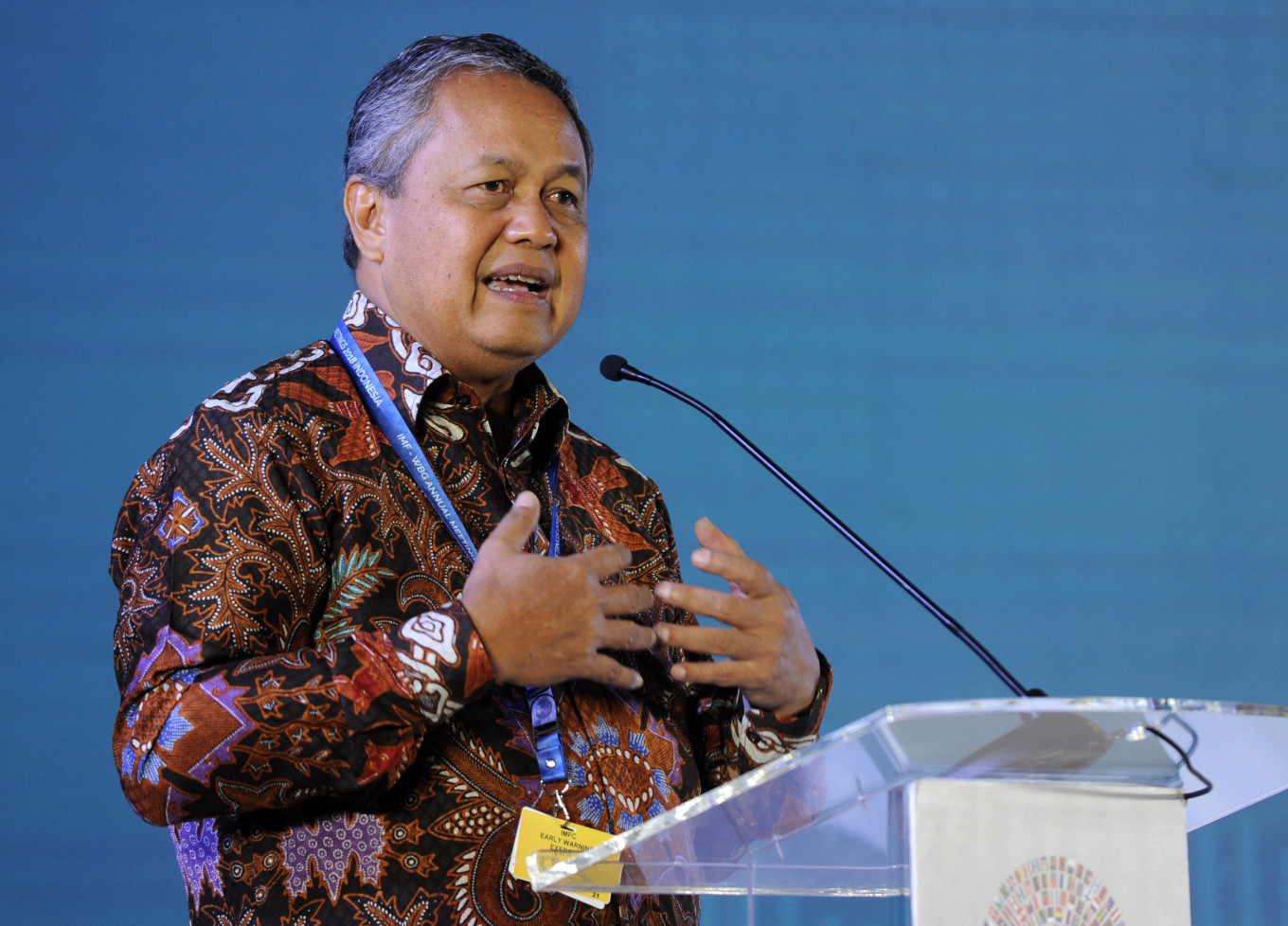Popular Reads
Top Results
Can't find what you're looking for?
View all search resultsPopular Reads
Top Results
Can't find what you're looking for?
View all search resultsBank Indonesia remains dovish despite rising inflation
Bank Indonesia has held the country’s most important interest rate at 3.5 percent while central banks around the world are hiking rates in response to growing price pressure.
Change text size
Gift Premium Articles
to Anyone
B
ank Indonesia (BI) has refrained from raising its benchmark interest rate even as the nation faces inflationary pressure and a depreciating currency.
In a virtual press briefing on Thursday, the central bank announced that its seven-day reverse repo rate (7DRRR) will remain at a record low level of 3.5 percent. It also kept its lending and deposit facility rates unchanged at 4.25 and 2.75 percent, respectively.
"This decision is consistent with the core inflation forecast, which is still under control amid the risk of the impact of the global economic slowdown on domestic economic growth," BI Governor Perry Warjiyo said after the monthly two-day monetary policy meeting.
Read also: Inflation soars more than expected, driven by food prices
Perry said there was a significant difference between headline inflation, or the increase in the consumer price index (CPI), and core inflation, which he said was the main indicator for BI’s benchmark interest rate decisions.
Statistics Indonesia (BPS) announced earlier this month that inflation increased to 4.35 percent year-on-year (yoy) in June, the highest rate since June 2017, with the expenditure category of food, beverages and tobacco still the dominant driver of consumer prices.
Perry acknowledged that this year's headline inflation could fall between 4.5 and 4.6 percent, which marks the latest upward revision to the central bank’s forecast, up from the previously announced projection of 4.25 percent, but said core inflation would stay between 2 and 4 percent.
That range is BI’s inflation target, but it would in the past be applied to headline inflation rather than core inflation.
"Bank Indonesia continues to be aware of the risk of rising inflation expectations and core inflation going forward and is strengthening the response through the necessary monetary policy mix."
To combat rising inflation without changing the interest rates, the central bank had multiple ongoing measures to normalize monetary policy, he said.
One of the long-standing policies of BI was to gradually raise the statutory reserve requirement, he said, which would not decrease the domestic liquidity needed to provide credit for business activities.
From March 1 to July 15, this measure had absorbed Rp 219 trillion (US$14.6 billion) of domestic banking liquidity, the governor said, which is almost twice the figure reported in the previous monthly BI policy meeting.
In an agreement with the Finance Ministry to support the economic recovery, the central bank has committed to continuous buying of government securities (SBN) in the primary market. Those purchases had reached Rp 56.11 trillion as of Wednesday, Perry noted, up 72 percent from the figure mentioned in the previous policy meeting.
"The distribution of bank loans and financing to the business world continues to reflect recovery with adequate liabilities being maintained," Perry continued.
Read also: Indonesia's financial sector needs more depth: World Bank
Although Perry acknowledged the depreciation of the rupiah against the United States dollar, which he said had reached 4.9 percent year-to-date, BI maintained the view that Indonesia's currency performed much better than those of other Southeast Asian countries.
Nonetheless, BI was implementing policies to stabilize the currency, Perry said, which included intervention in financial markets and increasing money market interest rates.
"The stabilization of the rupiah exchange rate is one part of controlling inflation through intervention in the foreign exchange market supported by strengthening monetary operations," Perry added.
Economists from state-owned Bank Mandiri estimated that the central bank would inevitably increase interest rates as external pressures mounts, in particular in response to hikes in the United States interest rate.
In a note received by The Jakarta Post on Thursday, the economists said they believed both headline and core inflation would continue to increase, which would prompt BI to raise interest rates to follow other countries.
The economists noted that 17 central banks had recently raised their interest rates due to concerns about inflation, including Malaysia and the Philippines, which had increased by 25 basis points (bps) and 75 bps, respectively.
"All in all, we expect BI to hike the 7DRRR by up to 75 bps to a maximum 4.25 percent in the second half of 2022," the note states.










